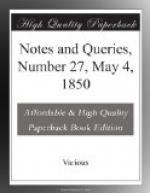that our then “unhappy divisions” did most
materially retard the numerical increase of the population,
as well as the progress of science and the useful
arts. Such is the inevitable consequence of war:
of civil war in a tenfold degree. And our parish
register books, all of which I doubt not show similar
facts, place this in the most unfavourable light;
for, through the spread of nonconformity, the unsettled
state of the times, and the substitution during the
protectorate of the registration of births which might
or might not be communicated to the elected parish
register, for that of baptisms which the parish priest
would both celebrate and register, the names of very
many of those born into the world would be altogether
omitted from these records. It may be interesting
to show the effects of some of these causes by the
subjoined extracts from the registers themselves,
which I transcribe from the Chronicon Mirabile
of the late Sir Cuthbert Sharpe.—(Vide pp.
17. 18. 22. 23. 70. 121. and 156.)
Staindrop, Durham.—“1644. From this time to 1646, through want of a Minister, and carelessness of ye Cleark, during ye wars, much of ye Register is lost, only here and there a name registered.”
“1652. June 14.
Mem. From this time till August there was noe
Minister, soe that ye children
were carried to other parishes to
be baptized.”
St. Helen’s Aukland, Durham, A.D. 1633.—“Mr. John Vaux, our minister, was suspended.... Mr. Robert Cowper, of Durham, served in his place, and left out divers christenings unrecorded, and regestered others disorderly.”
Gainford, Durham.—“Courteous Reader, this is to let thee understand that many children were left unrecorded or redgestered, but the reason and cause was this; some would and some would not, being of a fickle condition, as the time was then; this being their end and aim, to save a groate from the poor Clarke, so they would rather have them unredgestered—but now ... it is their design to have them redgestered.”
Lowestoft, Suffolk, 1644 ... “For some time following there was in this Town neither Minister nor Clarke, but the inhabitants were inforced to procure now one and then another to baptize their children, by which means there was no Register kept, only those few hereafter mentioned weare by myself baptized in those intervalls when I enjoyed my freedom.”
Hexham, Northumberland, c. 1655.—“Note y’t Mr. Will. Lister, Minister of S’t. John Lees in those distracted times, did both marry and baptize all that made ther application to him, for w’ch he was sometimes severely threatened by y’e souldiers, and had once a cockt pistoll held to his breest, &c., so y’t its no wond’r y’t y’e {442} Registers for these times are so imperfect, and besides, they are extremely confused.”
In the Preface to the Enumeration Abstract of the Census of 1841, pp. 34-37., your correspondent will find information and statistics relative to the estimated population of England and Wales, 1570-1750, compiled from the parish registers, and—




